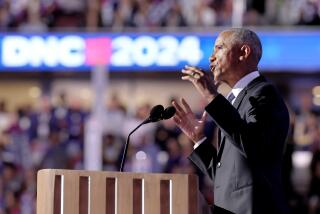Bushâs Attacks on Clintonâs Record May Make His Own Road Rockier
Itâs become conventional wisdom to look at George W. Bush as a belt-and-suspenders guy, utterly averse to risk. And like most journalistic shorthand, that assessment has at least some basis in fact. In the selection of Dick Cheney as his running mate, it was as if some recessive Bush family gene for caution suddenly resurfaced. Itâs easy to imagine the candidateâs father, former President Bush, on the phone to George W., whispering, âIt wouldnât be prudent,â as the Texas governor discarded bolder choices such as Thomas J. Ridge or John McCain.
But the younger Bush, at times, has been willing to roll the dice. He did it in 1997 when he proposed a massive overhaul of the Texas tax system. And he did it twice more in his often eloquent acceptance speech at the Republican convention last week. Embedded in the speech were two big gambles that could loom over the fall campaign. One is that Bush can define the Clinton era as a failure, not only in moral but policy terms. The second is that Bush can compete with Vice President Al Gore on core domestic issues that Democrats consider their own--education, Social Security, Medicare and uplifting the poor.
Of the two, the most audacious gamble is Bushâs effort to paint President Clintonâs two terms as a âmissed opportunity.â Bush, like most Republicans, has long portrayed Clintonâs presidency as an ethical failure. And since clinching the GOP nomination in March, Bush has charged that Clinton and Gore have dodged several tough, long-term issues--particularly education and entitlement reform.
But in their convention speeches last week, Bush and Cheney went further. Both men characterized Clinton and Gore as irrelevant bystanders in these fat years. Rhetorically separating the capital from the country, the GOP ticket offered a kind of immaculate conception theory of prosperity. Good times, they argued, emerged almost as a natural phenomenon in the 1990s; Washington was at best irrelevant, at worst complacent in failing to seize the opportunities that the strong economy presented. âFor eight years, the Clinton-Gore administration has coasted through prosperity,â insisted Bush.
That may be a hard sell. Even the most die-hard Democrat wouldnât attribute all the positive trends of the past eight years to Clinton policies. But itâs another thing to say that the federal budget deals of 1993 and 1997 that replaced massive federal deficits with expanding surpluses have been irrelevant to the economy. Or that the welfare reform bill of 1996 hasnât driven the historic reduction in the welfare rolls. Or that the 1993 increase in the earned-income tax credit hasnât lifted millions of working-poor families above the poverty line.
Or, for that matter, that tougher enforcement of the Community Reinvestment Act, which pressures banks to lend to low-income borrowers, hasnât helped fuel the unprecedented gains in homeownership among blacks and Latinos over the past eight years. Or that the federal subsidies to hire thousands of new police officers (even if not the 100,000 that Clinton billed) and spread the use of community policing have contributed nothing to the falling crime rate. âGood times donât just happen,â argues Bruce Reed, Clintonâs chief domestic policy advisor. âThey are the result of good choices.â
So far, Gore has had trouble selling that argument; heâs not running nearly as well among voters satisfied with the countryâs direction as the nominee of the party holding the White House usually does. But Democrats believe Bushâs effort to portray the past eight years as a âsquanderedâ opportunity may inadvertently provide the backdrop they need to drive home their case that the country is better off now than when Republicans held the Oval Office.
And, in fact, when they take the stage at their convention in Los Angeles next week, Clinton and Gore can argue that America has made more progress on most key economic and social challenges in the past eight years than it did in the 12 that Ronald Reagan and Bushâs father sat in the White House. During the Reagan and Bush years, the economy created 18.5 million new jobs; in less than eight years under Clinton, itâs created 22.1 million. Under Reagan and Bush the federal deficit rose from $74 billion to $290 billion; in 1999, the surplus hit $124 billion. From 1980 through 1992, the number of people on welfare increased by almost 30%; since then, itâs fallen by more than 40%. From 1980 through 1992, the violent crime rate increased by a fourth; since 1993, itâs dropped by a fifth. The list goes on.
Thus Bushâs gamble. If his disparaging characterization of the Clinton years has given Gore a greater opportunity to ask voters the classic question--âAre you better off than you were eight years ago?â--then Bush undoubtedly has made his own road rockier.
Bush may be on safer ground with his second bet. The governor has shown more capacity than any GOP nominee in memory to compete on core domestic issues; so far, Bush is running about even with Gore when voters are asked who can handle Social Security and education. Thatâs a testament to Bushâs success at painting himself as a reformer, while portraying Gore as someone who âcontinues on the same old path with the same old programs.â
Most Democrats believe that Bush wants to mute the debate on issues and try to win the White House on personal comparisons of character and leadership. (Much of the GOP convention pointed in that direction.) But in his acceptance speech, Bush muted nothing. He aggressively touted his plans to reform the schools, partially privatize Social Security and use a big chunk of the federal surplus for an across-the-board cut in income tax rates. Bring it on, Bush seemed to say to Democrats, who believe they hold the advantage on all these questions.
Thatâs a gamble too. Bush embodies a generation of conservatives confident they have seized the mantle of reform from Democrats wedded to old approaches. But on all these issues, polls show plenty of support for competing Gore ideas, such as paying down the national debt (rather than cutting taxes) or spending more to build new schools. By raising the visibility of these domestic debates, Bush has increased the consequences if he canât remain competitive in them. Yet Bush is also displaying a gamblerâs instinct thatâs kept Gore on the defensive; to overcome him, Gore may have to take some uncharacteristic risks of his own.
*
See current and past Brownstein columns on The Timesâ Web site at: http://ukobiw.net/brownstein.
More to Read
Get the L.A. Times Politics newsletter
Deeply reported insights into legislation, politics and policy from Sacramento, Washington and beyond. In your inbox three times per week.
You may occasionally receive promotional content from the Los Angeles Times.










